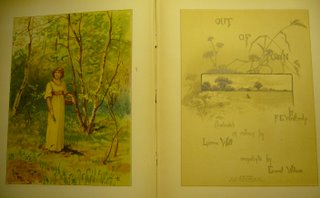 Because people know I'm a book cataloger and a bibliophile, I'm occasionally given old books by friends and relatives. Books acquired for little or nothing, which the donor doesn't quite know what to do with, but thinks might have some value.
Because people know I'm a book cataloger and a bibliophile, I'm occasionally given old books by friends and relatives. Books acquired for little or nothing, which the donor doesn't quite know what to do with, but thinks might have some value."Hmm, maybe Cicily would want this decrepit but kind of interesting old book."
That's how I came upon this copy of Out of Town by F. E. Weatherly. One of my cousins picked it up at the Goodwill and passed it on to me. "It's falling apart," she said, "but the pictures are nice, and maybe you could cut it up and frame them."
Her place is tiny, and she shares it with one of those guys who's really talented but not at all ambitious...one of those guys who'd rather be fishing or smoking weed than working. Every square inch of the place is covered with his aquariums and his marionettes, or has a cat draped over it. I, on the other hand, live with my two minimalist sons in a cavernous Victorian. Loads of 10-foot-high walls on which to hang framed prints from picture books.
Of course, I checked the value of the book when I got it home, and sure enough, it 's worth some bucks. The cheapest copy for sale on the net is $90, and they go up to almost $200. None seems to have the poor binding that my copy has, but that's not really a huge issue with old books, as many people don't realize. It's more important for the interior to be in good condition. Underlining, evidence of library ownership, bookworm damage, water damage and so on are more serious flaws--things that can't be rectified by rebinding.
Frederic Edward Weatherly was an Oxford-trained lawyer, but more famous as a songwriter. He was prolific, with over 3000 songs to his credit. The one everybody's heard of is "Danny Boy." Out of Town is a book of poems, lyrical, as one might imagine. It was published in 1880.
This book has not one but two illustrators. Linnie Watt, a painter who's not totally lost to history, did the lovely chromolithographs. Ernest Wilson did the monotints, which are charmingly integrated with the text. In the poem "Two O'Clock," which begins, "Sing a song of two o'clock, Tadpoles in a pool," the capital "S" is a tadpole. The "Y" which begins "Gentleman John" is a rake. Leaves and branches twine all around the text; a crab hangs by a pincer onto a poem about the seashore.
I haven't got the heart to cut the book to pieces, and of course now I know it's worth more money in one piece. Anyway I've got literally dozens of paintings, photographs, and mirrors yet to be hung--I don't need any more. Out of Town has come to the right place--a creaky old house where everything, including the owner, is vintage, and being old and a little worn out is just the way to be.
Bet your cousin was amused to find out about the prices ;-)
ReplyDelete